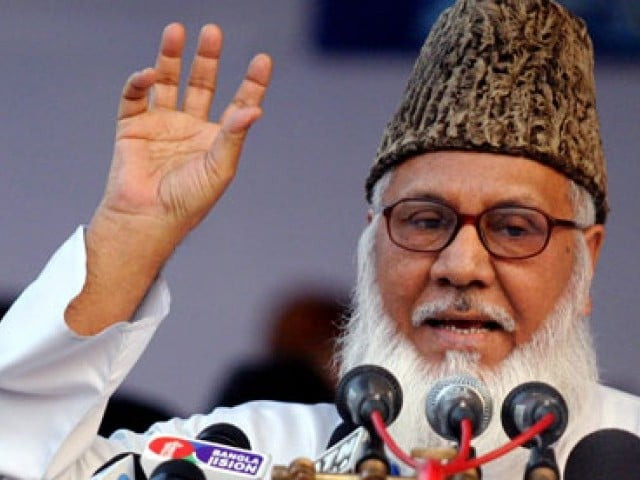Clashes in Bangladesh after Jamaat leader's hanging
Police fire rubber bullets at 500 Jamaat activists as they become violent while protesting the execution

Motiur Rahman Nizami. PHOTO: REUTERS
Motiur Rahman Nizami, leader of the Jamaat-e-Islami party, was hanged at a Dhaka jail late Tuesday for the massacre of intellectuals during the 1971 independence war with Pakistan.
Police said they fired rubber bullets after hundreds of Nizami's supporters attacked them with stones in the northwestern city of Rajshahi, where a liberal professor was killed by suspected militants last month.
Bangladesh hangs religious party leader for 1971 war crimes
"There were 500 Jamaat activists who were protesting the execution. We fired rubber bullets as they became violent," Rajshahi police inspector Selim Badsah told AFP, adding that about 20 were arrested.
Jamaat and ruling party supporters also clashed in Chittagong, where about 2,500 militants attended a service for the executed leader, the port city's deputy police chief Masudul Hasan told AFP.
Security was tight across the country, with checkpoints erected on main roads in Dhaka to deter violence, and thousands of police patrolling the capital.
Nizami, a 73-year-old former government minister, was the fifth and the most senior opposition figure executed since the secular government set up a controversial war crimes tribunal in 2010.
Bangladesh clears execution for top extremist leader
Security was also stepped up in Nizami's ancestral district of Pabna, where his body was taken under armed escort for burial in his family's grave.
"At least 16 activists of Jamaat were arrested (in Pabna) Tuesday night as part of the security clampdown," local police inspector Ahsanul Haq said.
Jamaat called a nationwide strike for Thursday in protest at Nizami's execution, saying the charges against him were false and aimed at eliminating the party's leadership.
Executions of Jamaat officials in 2013 triggered the country's deadliest violence in decades. Around 500 people were killed, mainly in clashes between extremists and police.
But a fresh wave of bloodshed is considered unlikely following a major crackdown by Prime Minister Sheikh Hasina's government that has seen tens of thousands of Jamaat supporters detained.
Pakistan concerned at JI chief’s death sentence
Secular protesters cheered the midnight hanging, with hundreds gathered outside the jail and at a square in central Dhaka overnight to celebrate what they described as an historic moment.
Mubashar Hasan, an assistant professor at Bangladesh's University of Liberal Arts, said Tuesday's execution may sound the death knell for the already embattled Jamaat.
"With the execution of Nizami, the Jamaat leadership who revived the fortune of the party in the post-1971 period are now almost gone," he said.
It comes amid a wave of gruesome murders by suspected militants, with an atheist student, two gay rights activists, a professor, a Hindu tailor and a Sufi Muslim leader hacked to death since last month.
The Islamic State and a Bangladesh branch of al Qaeda have claimed responsibility for several murders, but the government blames homegrown extremists and accuses the opposition of trying to destabilise the country.
Nizami took over as Jamaat leader in 2000 and played a key role in the victory of an militant-allied government in the 2001 general election.
Bangladesh professor hacked to death in ‘Islamist’ attack
The 1971 conflict, one of the bloodiest in world history, led to the creation of an independent Bangladesh from what was then East Pakistan.
Prosecutors said Nizami was responsible for setting up the pro-Pakistani al Badr militia, which killed top writers, doctors and journalists in the most gruesome chapter of the war.
He was convicted in October 2014 by the International Crimes Tribunal, which has sentenced more than a dozen opposition leaders for war crimes in trials criticised by rights groups.



















COMMENTS
Comments are moderated and generally will be posted if they are on-topic and not abusive.
For more information, please see our Comments FAQ